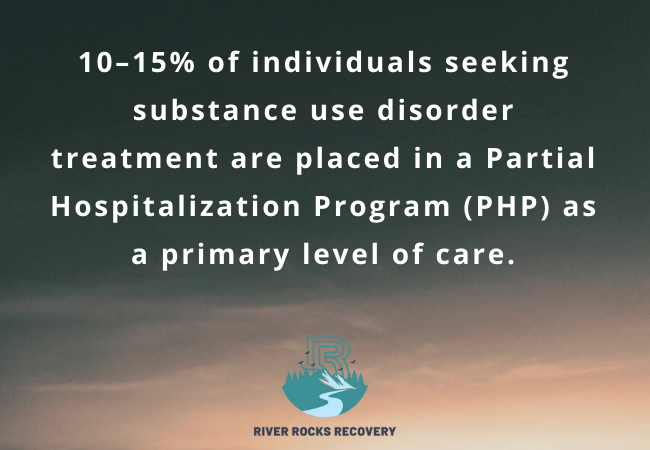Recovery from substance use is a deeply personal journey, and finding the right level of care can make all the difference in achieving lasting sobriety. One treatment option that offers a middle ground between inpatient and outpatient care is the Partial Hospitalization Program (PHP). PHPs are designed to provide structured and intensive support while allowing individuals to maintain some aspects of their daily life outside a residential setting. But is PHP the right choice for your recovery?
Understanding how a Partial Hospitalization Program works, who it’s best suited for, and how it compares to other treatment options like inpatient or outpatient programs can help you make an informed decision. For many individuals in early recovery or those stepping down from a more intensive level of care, PHP may offer the ideal balance between structure and independence.
What Is a Partial Hospitalization Program (PHP)?
A Partial Hospitalization Program is a structured form of treatment that provides clinical care for several hours a day, typically five to seven days per week, without requiring an overnight stay. Clients in PHP receive a variety of therapies, including individual counseling, group therapy, medication management, and psychoeducation. The program is designed to help clients address the psychological, emotional, and behavioral aspects of addiction while also preparing them for greater independence.
PHPs are considered a step down from inpatient or residential treatment, where 24/7 care is provided. At the same time, they are more intensive than standard outpatient programs, offering a higher level of care for those who still need frequent support but are ready to start transitioning back into their daily lives.
This format is especially beneficial for individuals who may not require the round-the-clock supervision of inpatient care but still need more structure than traditional outpatient treatment offers. The flexibility of PHP also allows many clients to maintain some personal responsibilities, such as living at home or caring for a family, while receiving the focused care they need.
Who Benefits Most from PHP?
The ideal candidates for PHP are individuals who are stable enough to avoid 24-hour supervision but still face challenges that make outpatient care insufficient. People in the following situations may benefit most from a Partial Hospitalization Program:
-
Those transitioning from inpatient care: PHP serves as a critical step-down for individuals who have completed inpatient or residential treatment and are preparing to reintegrate into daily life. The program helps maintain continuity in care while offering more freedom.
-
People with co-occurring disorders: Individuals who experience both substance use and mental health disorders often benefit from PHP, as the structured environment allows for focused care on both issues without requiring full hospitalization.
-
Clients at high risk for relapse: PHP can be helpful for individuals who are newly sober or have a history of relapse. The frequent contact with clinicians and peers provides accountability and immediate support during high-risk periods.
-
Those who need intensive care but have strong support systems: PHP works well for individuals who have a stable and supportive home environment, which allows them to return home each day after treatment without compromising their recovery.
If you or someone you love fits one of these categories, a Partial Hospitalization Program may be the right choice to sustain progress in recovery while beginning to navigate the responsibilities of everyday life.
What Happens During PHP?
Each day in a PHP is carefully structured to include evidence-based therapies and holistic approaches that address the underlying causes of addiction. A typical day might begin with a morning group therapy session focused on topics such as emotional regulation, relapse prevention, or coping strategies. Later in the day, clients may participate in individual counseling, meet with medical staff for medication monitoring, or take part in specialized therapy sessions like trauma therapy or cognitive-behavioral therapy.
Group therapy is a key component of PHP, providing individuals with a community of peers who understand the challenges of recovery. This environment fosters connection, accountability, and encouragement. Psychoeducational classes also help clients understand the nature of addiction and develop tools to maintain sobriety long-term.
By the end of the day, clients return home or to a sober living environment, where they can apply the skills they’ve learned in treatment to real-life situations. This process of practicing new coping strategies in a less-controlled setting is essential in bridging the gap between treatment and independent living.
PHP vs. Inpatient and Outpatient Programs
Understanding the differences between various levels of care is essential in determining which one is the best fit. Inpatient programs offer the highest level of care, including 24/7 medical supervision and support. They are ideal for individuals in active withdrawal or those facing severe psychological distress. However, inpatient care may not be necessary for everyone, especially those who are medically stable.
Outpatient programs, on the other hand, typically involve only a few hours of treatment per week and are best for individuals who are well into recovery and can manage their sobriety with minimal clinical support. Outpatient programs offer flexibility, but that flexibility can also be a risk for those who need more structured care.
PHP strikes a balance between the two. It offers intensive therapeutic services without requiring full hospitalization, making it a highly effective option for many people, especially those who fall between needing inpatient care and managing independently with outpatient services.
For example, individuals participating in an Intensive Outpatient Program in Middletown, Ohio may find that they need more structure and accountability. In such cases, transitioning to a PHP provides a higher level of care without returning to full inpatient treatment.

Transitioning Through Levels of Care
Recovery is not a one-size-fits-all journey, and most individuals will benefit from transitioning through different levels of care as they progress. A common pathway might begin with detox, followed by residential or inpatient treatment, then PHP, then an intensive outpatient program, and finally standard outpatient care.
This stepped approach to recovery helps individuals gradually build confidence and independence. It also ensures that support systems are in place at every stage. Many individuals begin their journey at an Addiction Treatment Program in Middletown, Ohio, and move through each level based on clinical recommendations and their progress in recovery.
For some, starting directly in a PHP is appropriate—especially if they have already completed a medical detox or have a stable home environment. For others, PHP may be part of a broader continuum of care that ensures no one is ever left without support during their journey.
Flexibility and Personalization in PHP
One of the greatest benefits of PHP is its flexibility. Treatment plans are individualized to meet the unique needs of each client. Whether someone is focusing on trauma, dual diagnosis, relapse prevention, or rebuilding life skills, PHP can be tailored accordingly.
Clients may also receive referrals for complementary services such as vocational training, family therapy, or 12-step meetings, allowing them to receive support in all areas of life. This kind of personalized care is especially important for individuals transitioning to or from other levels of care, such as an Outpatient Treatment Program in Middletown, Ohio, where the support is less intensive but still vital.
Why Choose Us?
At River Rocks Recovery, we’re dedicated to providing compassionate, evidence-based care in a supportive and welcoming environment. Our programs are designed with the understanding that no two recovery journeys are alike. Whether you are seeking help for the first time or continuing a long-term recovery plan, our team will meet you with respect, professionalism, and proven strategies to help you succeed.
We proudly serve individuals looking for a Partial Hospitalization Program in Middletown, Ohio, providing the structure, support, and clinical care necessary to rebuild a healthier life. Our facility offers a calm, nurturing environment where healing can begin, and our expert staff brings years of experience helping people navigate the challenges of substance use and mental health issues.
Conclusion
Deciding whether PHP is right for you comes down to understanding your current needs, goals, and support system. If you’re looking for a level of care that bridges the gap between inpatient and outpatient treatment, and you’re ready to commit to a structured yet flexible program, then PHP may be the ideal path forward.
River Rocks Recovery is here to support you every step of the way. We provide a range of treatment options and will work with you to design a plan that matches your needs. If you or someone you love is searching for an Addiction Treatment Center Middletown, Ohio, call us today at (888) 905-6281 to learn more about how we can help.
Frequently Asked Questions (FAQs)
What is a Partial Hospitalization Program (PHP)?
A Partial Hospitalization Program (PHP) is a structured treatment plan that offers intensive therapy during the day while allowing patients to return home at night. It provides a higher level of care than outpatient treatment but doesn’t require overnight stays.
Who is the ideal candidate for PHP?
The ideal candidate for PHP is someone who needs consistent support for mental health or substance use issues but doesn’t require 24/7 supervision. PHP works well for those transitioning from inpatient rehab or who need more structure than outpatient care.
How long does a PHP program typically last?
PHP programs usually last between 2 to 4 weeks, depending on individual progress. Patients attend treatment 5–7 days a week for several hours each day.
What types of therapies are offered in PHP?
Most PHPs offer individual therapy, group therapy, family counseling, medication management, and behavioral therapies like CBT or DBT, all tailored to each patient’s needs.
Is PHP covered by insurance?
Yes, most health insurance plans cover PHP under behavioral health benefits. It’s important to check with your provider or the treatment center for specific coverage.
How does PHP differ from inpatient rehab?
Inpatient rehab involves 24/7 supervision and on-site living, while PHP allows patients to live at home but receive daily structured care. PHP is often a step-down from inpatient treatment.

